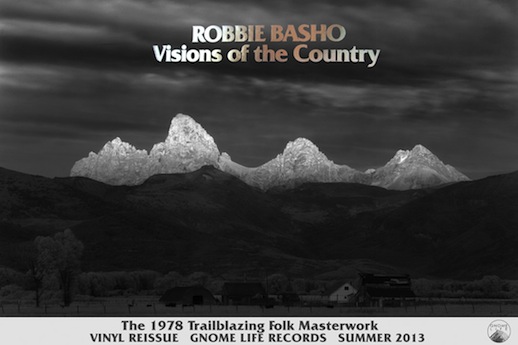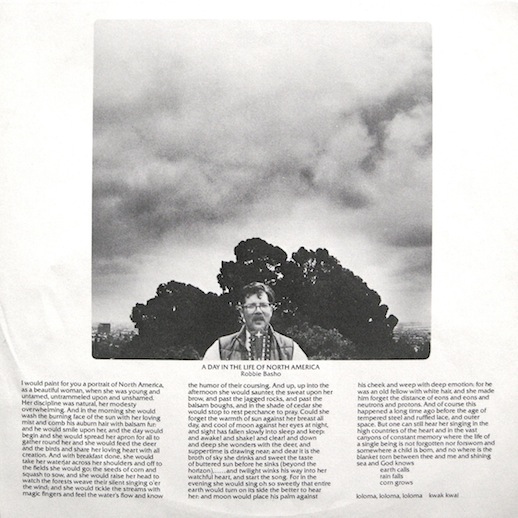Robbie Basho’s 1978 LP, Visions of the Country, is now back in print after almost 35 years. It happens to be one of Jerry De Cicca’s all time favourite records so we asked him for a few words:
The first time I heard Robbie Basho’s name was the same night I met Jack Rose. This was back in 1999, in Philadelphia, and Jack and I were in the kitchen of a mutual friend, listening to Charalambides play a gorgeous and quiet set. Jack and I got to talking and realized we had chatted on the phone the year before when his band, Pelt, were supposed to play the record store I worked at in Albuquerque, New Mexico on their tour with Brother JT and Vibrolux. Their van had broken down (or maybe they got lost, I can’t remember), so this became our first hang. I told him I recently moved down the street, 8th and Catherine, my record collection in tow. He said, “Do you like Fahey?” with a look that said, this answer will determine if we’re to become friends. I said, yes, quite a bit and then proved it by listing which records were on my shelf, designating first pressings from reissues, because just saying “yes” hadn’t seemed to satisfy him. We talked about Sandy Bull, Leo Kottke, and Mississippi John Hurt, and then Jack said he was just getting into this guy named Robbie Basho and really loved it. I had never heard of him.
The next week, Jack showed up at my door with his vinyl copies of The Falconer’s Arm II and Song of the Stallion in one hand and a six pack in the other. Almost like a warning, he told me that Basho sings on some songs and that it might not be for everyone. We listened to Song of the Stallion first, and I loved it immediately, especially Basho’s voice. It was high and lonely, ethereal and impish, Appalachian and otherworldly, one with his guitar’s Eastern phrases. Fahey seemed more masculine and colder to me after hearing Basho, the difference between the beauty of math and the beauty of poetry. Nothing I heard seemed put on — it sounded more sincere than strange, cerebral but still emotional. In fact, it wasn’t until years later that it occurred to me that maybe Basho wasn’t his birth name, and I still don’t know. I accepted him and his music without question. It was a major discovery courtesy of a new friend.
After we each drank 3 beers and agreed Champion Jack Dupree’s Blues from the Gutter is one of the greatest records ever made, Jack left, borrowing my copies of the first four Tony Joe White albums while I held onto the Basho. We repeated this late afternoon hang, sometimes with more than just a 6 pack, almost every week until I moved again, back to Ohio, that spring.
By the following summer, I was back working in a record store, and through an estate auction of 1000s of guitar-focused lps I acquired some incredible albums: Robert Pete Williams’ Louisiana Blues and Bukka White’s Mississippi Blues, both on Takoma, Pat Kilroy’s Light of Day, and a later record by Robbie Basho (I had managed to find my own copies of the earlier ones by then). Visions of the Country, originally released by Windham Hill records in 1978 and now rereleased courtesy of Gnome Life Records, looked unlike his older records: mannered, monochrome, and font-heavy. I know a lot of people turn their nose up at the idea of Windham Hill Records, the label that brought New Age music to the mainstream, but I was open-minded. I’ve always enjoyed the clean tonality and playing on their best, early releases, like a cross between Folkways’ minimalist records and Eno’s Ambient series. And by this time, I knew that the label’s founder, William Ackerman, studied under Basho and his debt to Fahey was audibly heavy.
Visions of the Country is Basho balancing all his studies at once: Persian, Japanese, Indian, Native American, American blues and ballads. It begins with “Green River Suite,” and as Basho moves through the various movements, the song weaves classical and raga as he sings the operatic praises of Green River, Wyoming, calling out to its “sweet water,” also the name of the county in which the town is found. In “Rocky Mountain Raga,” Basho is joined by violinist Antoinette Marcus, who studied with Ali Akbar Khan and performed with — get this group of humans — Van Morrison, Tony Conrad, Kenny G, and La Monte Young. But Basho always sounds like the American West, even on a raga, and his cowboys and Indians sound like pacifists, the journeyman and the native praying together. You wish his music had found its way into western movies, like Bruce Langhorne’s The Hired Hand. But can a film in a wild, open landscape exist without conflict or aggression? Basho’s music seems to transcend the blues. It is only in the song “Night Way” that I hear any emotional tension. Though his guitar is often tuned up, there’s something about his phrasing and lyrics that remind me of Gabby Pahinui, father of the slack key guitar. Lyrical and dreamy, from an island or another planet or atop a mountain. Basho always sounds relaxed, like he’s never sat in traffic or been in an argument. He sings vowels more than consonants, much as you would with the limited, 12-letter Hawaiian alphabet.
The reissue stays true to the original album art of Ed Cooper, as it should, but the black and white Grand Teton mountain (the highest mountain in a national park several hours north of Green River) on the cover feels at odds with Basho’s Americana, which is always vibrant, gushing, and in motion. It is only on “Leaf in the Wind,” where he trades the guitar for a piano and singing for whistling (on this reissue, the transfer’s clarity is so intimate that you can hear him wetting his lips) that the stillness of Coopers’ photograph feels appropriate. Basho has said that he tries to play the piano like the santoor, a Persian dulcimer, and its percussive quality here sounds almost avant-garde. The album’s final song, “Call on the Wind,” is one of the most lovely pieces of music Basho ever recorded and the closest to singer-songwriter fare (along with “Blue Crystal Fire” and “Orphan’s Lament”), with Antony Hegarty as the best comparison. He asks us to “follow the milky way….home,” as if everyone can see the stars as clearly as he.
I don’t know very much about Robbie Basho as a person. Did he have friends? Was he at peace with himself? Was he happy with how his music existed in the world? Did he know what it felt like to be loved? If you want to learn more about him, I suggest you go see the guitarist Glenn Jones. Besides being the best keeper of the Takoma tradition, he reviewed this album upon its release, which led to a friendship with Basho. He’s a fantastic raconteur, very captivating and a kind human being. I don’t know Glenn well, but you can tell him I sent you.
In a 1974 radio interview, Basho responded to his world music being called “far out”: “I just call it a different level of feeling. It’s ‘far in’ as far as I’m concerned” and then discusses finding joy in other cultures. “America, culturally, has its head in a garbage can instead of the honey pot,” he said. “By god, it could use a little of the dignity of other cultures to say what it wants to say.” When listening to him talk, Basho doesn’t sound angry, but matter of fact. In that same interview, he mentions this record, which he won’t make for several more years, by the alternate title Warriors of the Rainbow. He discusses how music in America needs to go deeper instead of just “ruffling feathers” of its history. He does this on Visions of the Country so successfully and in the most unselfconscious and generous way, a vessel for the music.
There’s a million ways to meet a record and a musician. If you’re not already familiar with Robbie Basho’s music, I hope this note and album is a positive introduction for you. Over the years, Visions of the Country, has become one of my favorite of his albums. Basho has made me rethink my ideas about sound, identity, composition, and expression many times over. For the way in which his guitar and voice entered my life, I feel lucky. Thanks, Jack.
Jerry David DeCicca is the singer-songwriter for The Black Swans and producer of albums by Ed Askew (Tin Angel) and Larry Jon Wilson (1965 Records/Drag City w/ Jeb Loy Nichols). His solo debut, Understanding Land, will be self-released worldwide in April. It includes contributions by Will Oldham, Kelley Deal, and the legendary Spooner Oldham.

